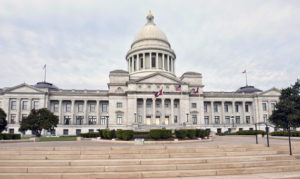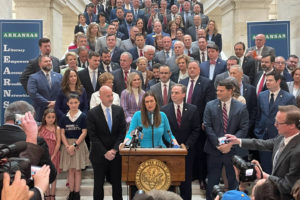Private schools receiving education voucher funds not subject to open records requests, Arkansas AG says
Arkansas private schools that accept state school choice funds are not subject to Freedom of Information Act (FOIA) requests, according to an opinion released by Attorney General Tim…

Arkansas private schools that accept state school choice funds are not subject to Freedom of Information Act (FOIA) requests, according to an opinion released by Attorney General Tim Griffin.
“Indirect ‘government benefits or subsidies’ do not make a private entity subject to the FOIA,” Griffin wrote in the Aug. 26 opinion.
The opinion comes amid a three-year roll out of Arkansas’ 2023 LEARN Act’s Educational Freedom Account (EFA) school choice program, a reported nationwide increase in FOIA requests for public schools, and rising public support for educational choice.
Griffin outlined a two-part test for determining whether a private school must comply with FOIA requests.
“To be subject to the FOIA, a private school must (1) receive public funds and (2) have its activities intertwined with those of the government,” he wrote.
Private schools receiving EFA funds fulfill the first requirement but not the second, he ruled. Being “intertwined” requires that the government has significant influence over, or has delegated its responsibilities, to the school.
For example, an independent public charter school would indeed be an intertwined entity, as it is contracted and funded by the government to provide a public, tuition-free education. In contrast, however, funds from EFAs are directed by the student, not the government, to an educational institution of choice.
Students using EFAs for non-public education in Arkansas will receive 90% of the amount public schools receive per pupil in state funding after the program finishes its roll out in the 2025-26 school year.
Griffin’s opinion provides legal reasoning to back students’ access to affordable private education options without introducing requirements or regulations that might compromise the values or missions of private schools.
State Sen. Clarke Tucker, D-Little Rock, requested the opinion from the attorney general’s office, and is named at the beginning of the document. Tucker called the opinion “well-reasoned” Monday, but told the Arkansas Democrat Gazette he believes private schools receiving the majority of their funding from vouchers should be subject to FOIA.
According to several polls commissioned from Real Clear Opinion, Americans’ support for such school choice initiatives has risen from 64% to 71% since 2020. Rising support is consistent across demographics, with a majority of all political parties and racial backgrounds backing such measures.
Yet, these policies still face pushback from some lawmakers, unions and educational activist groups.
Opponents of school choice initiatives in Arkansas and elsewhere say school choice funds such as EFAs are a form of direct funding by the government, so private, religious or homeschool programs accepting the funds should be subject to the same regulations and oversight as public schools – including such things as FOIA requests, curriculum standards, financial audits and more.
However, advocates of educational freedom argue the funds are a way of returning taxpayer money earmarked for education to taxpaying families who prefer to spend those dollars on non-public education – so the government shouldn’t take unnecessary control of private schools simply because families choose to spend their vouchers there.
For now, Arkansas law and its interpretation by the attorney general bolster that position.



